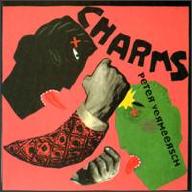Apparently feeling constrained by the thoroughly scored approach of Maximalist!, Vermeersch formed the sax-fueled avant-prog outfit X-Legged Sally (XLS) in 1988; the group's lineup included Vermeersch on both clarinet and tenor saxophone, Plouvier on keyboards, and Sleichim on alto saxophone as well as guitarist Pierre Vervloesem, baritone and tenor saxophonist Michel Mast, drummer Danny Van Hoeck, and bassist Paul Belgrado. Like Maximalist!, XLS performed music for dance productions, but incorporated improvisation and began incorporating more rock- and jazz-based approaches. The band made forays into the New York City downtown scene, performing at the Knitting Factory, and released two albums, 1991's Slow-Up and 1993's Killed by Charity, that were produced by Bill Laswell. Other albums released by XLS during the '90s included 1994's Eggs and Ashes, 1995's The Land of the Giant Dwarfs (on the Knitting Factory Works label), the 1996 live outing Fired, and 1997's Bereft of a Blissful Union, a collaboration with the Smith Quartet. X-Legged Sally disbanded in 1997; the group had undergone a number of personnel changes during its existence, its latter-day incarnations including keyboardist Peter Vandenberghe, trumpeter Bart Maris, and singer Thierry Mondelaers.
Upon the breakup of XLS, Vermeersch formed the avant pop/rock band A Group, with a lineup including Vervloesem and Mondelaers along with vocalist/keyboardist Anne Fontigny and drummer Didier Fontaine. A Group released two albums, Volume 1 and Volume 3, and disbanded in 1999.
Vermeersch launched his most ambitious and longest-lasting project to date, the theatrical avant big band Flat Earth Society (FES), in late 1998, although early versions of the group had performed at a children's music festival in 1997 and had also appeared on the A Group Volume 3 track "Porque Te Vas." With an 18-piece lineup including former XLS members Maris, Mast, Vandenberghe, and Van Hoeck, the big-band FES held its first concerts in Ghent and Brussels in February 1999, followed by a live broadcast on Belgian National Radio (Radio 1), selections from which were released on a Viakra label EP entitled Live at the Beursschouwburg in January 2000. In January 2001, the band's first full-length CD, Bonk, was released on the Zonk label, founded by Vermeersch after Viakra went bankrupt.
Over the next decade and beyond, while maintaining a relatively stable lineup of between 15 and 18 musicians, FES released a slew of albums including the theater production soundtrack Larf (2001); Trap and the film soundtrack album Minoes (both 2002); the Louis Armstrong tribute The Armstrong Mutations (2003); Psychoscout (2006) and Cheer Me, Perverts! (2009), both released by Crammed Discs; Answer Songs (2009); and the band's 13-track 13th anniversary 13th album, 13 (2013). In 2004 a "best-of" compilation, comprised mainly of tracks from The Armstrong Mutations and Minoes, was released on Mike Patton's Ipecac label. FES has also been involved in numerous musical theater, dance, film soundtrack, and unclassifiable projects over the years, including the 2008 "existential variety farce" Zilke and 2011's R.I.P. -- Funeral Songs, in which the full ensemble begins the show but the band continues to shrink in size as the musicians "die," one after the other, while the performance progresses.
In addition to recordings with Maximalist!, X-Legged Sally, A Group, and Flat Earth Society, albums released under Vermeersch's name include De Oplosbare Vis (1995), Weg (with Josse de Pauw and Pierre Vervloesem, 1999), and Charms (2000). Vermeersch also co-produced (with Vervloesem) and played bass clarinet on Worst Case Scenario, the 1994 debut album by Antwerp-based experimental rock band dEUS. ~ Dave Lynch, Rovi












